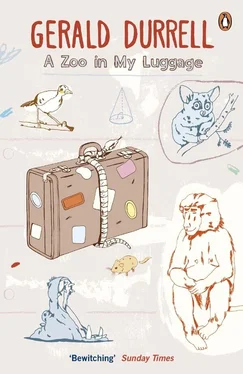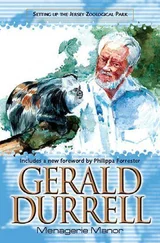Gerald Durrell - A Zoo in My Luggage
Здесь есть возможность читать онлайн «Gerald Durrell - A Zoo in My Luggage» весь текст электронной книги совершенно бесплатно (целиком полную версию без сокращений). В некоторых случаях можно слушать аудио, скачать через торрент в формате fb2 и присутствует краткое содержание. Жанр: Природа и животные, на английском языке. Описание произведения, (предисловие) а так же отзывы посетителей доступны на портале библиотеки ЛибКат.
- Название:A Zoo in My Luggage
- Автор:
- Жанр:
- Год:неизвестен
- ISBN:нет данных
- Рейтинг книги:4 / 5. Голосов: 1
-
Избранное:Добавить в избранное
- Отзывы:
-
Ваша оценка:
- 80
- 1
- 2
- 3
- 4
- 5
A Zoo in My Luggage: краткое содержание, описание и аннотация
Предлагаем к чтению аннотацию, описание, краткое содержание или предисловие (зависит от того, что написал сам автор книги «A Zoo in My Luggage»). Если вы не нашли необходимую информацию о книге — напишите в комментариях, мы постараемся отыскать её.
A Zoo in My Luggage — читать онлайн бесплатно полную книгу (весь текст) целиком
Ниже представлен текст книги, разбитый по страницам. Система сохранения места последней прочитанной страницы, позволяет с удобством читать онлайн бесплатно книгу «A Zoo in My Luggage», без необходимости каждый раз заново искать на чём Вы остановились. Поставьте закладку, и сможете в любой момент перейти на страницу, на которой закончили чтение.
Интервал:
Закладка:
March 17: Young pigmy mongooses flatly refuse to feed from bottle or from fountain-pen filler. In view of this (since their chances seemed slim) put them into cage with female. To my surprise she has accepted them and is suckling them well. Most unusual. Had two broken leg jobs today: Woodford’s owl which had been caught in a gin-trap and a young hawk with a greenstick fracture. I don’t think the owl will regain use of leg for all the ligaments appear to be torn, and the bone badly splintered. Hawk’s leg should be O.K. as it’s a young bird. Both are feeding well. Demidoff’s make a faint mewing hiss when disturbed at night, the only sound I have heard them make apart from their bat-like twittering when fighting. Clawed toads have started to call at night: very faint ‘peep-peep’ noise, rather like someone flicking the edge of a glass gently with finger-nail.
April 2: Young male chimp, about two years old, brought in today. Was in a terrible mess. Had been caught in one of the wire noose-traps they use for antelopes, and had damaged its left hand and arm. The palm of the hand and the wrist were split right open and badly infected with gangrene. The animal was very weak, not being able to sit up, and the colour of the skin was a curious yellowish grey. Attended to wound and injected penicillin. Drove it in to Bemenda for the Dept. of Agriculture’s vet to have a look at, as did not like skin colour or curious lethargy in spite of stimulants. He took blood test and diagnosed sleeping-sickness. Have done all we can but the animal appears to be sinking fast. He seems pathetically grateful for anything you do for him.
April 3: Chimp died. They are a ‘protected’ animal and yet up here, as in other parts of the Cameroons, they are killed and eaten regularly. Big rhinoceros viper fed for first time: small rat. One of the green forest squirrels appears to be developing a bald patch on his back: presume lack of vitamins so am increasing his Abidec. As we now get good supply of weaver-birds’ eggs each day all the squirrels are getting them, in addition to their normal diet. The brush-tail porcupines, when disturbed at night beat rapid tattoo with their hind-feet (like a wild rabbit) then swing their backside round to face danger and rustle bunch of quills on end of tail, producing a sound reminiscent of rattle-snake.
April 5: Have found simple, rapid way of sexing pottos. Nice young male brought in today. Although external genitalia in both sexes are remarkably similar to a superficial glance, have discovered that simplest way is to smell them. The testicles of the male give out a faint, sweet odour, like pear drops, when the animal is handled.
We were not the only ones interested in the animals. Many of the local people had never seen some of the creatures we had acquired, and many called and asked for permission to look round the collection. One day the Headmaster of the local Mission School called and asked if he could bring his entire school of two-hundred-odd boys to see the collection. I was glad to agree to this, for I feel that if you can, by showing live animals, arouse people’s interest in their local fauna and its preservation you are doing something worthwhile. So, on the appointed date, the boys came marching down the road in a double column, shepherded by five masters. In the road below the Rest House the boys were divided up into groups of twenty and then brought up in turn by a master. Jacquie, Sophie, Bob and I took up stations at various points in the collection to answer any queries. The boys behaved in a model fashion; there was no pushing or shoving, no skylarking. They wended their way from cage to cage, absorbed and fascinated, uttering amazed cries of ‘Wah!’ at each new wonder and clicking their fingers in delight. Finally, when the last group had been led round, the Headmaster grouped all the boys at the bottom of the steps and then turned to me, beaming.
‘Sir,’ he said, ‘we are very grateful to you for allowing us to see your zoological collections. May I ask if you would be kind enough to answer some of the boys’ questions?’
‘Yes, with pleasure,’ I said, taking up my stand on the steps above the crowd.
‘Boys,’ roared the Head, ‘Mr Durrell has kindly say that he will answer any questions. Now who has a question?’
The sea of black faces below me screwed themselves up in thought, tongues protruded, toes wiggled in the dust. Then, slowly at first, but with increasing speed as they lost their embarrassment, they shot questions at me, all of which were extremely intelligent and sensible. There was, I noticed, one small boy in the front of the crowd who had, throughout the proceedings, fixed me with a basilisk eye. His brow was furrowed with concentration, and he stood stiffly at attention. At last, when the supply of questions started to peter out, he suddenly summoned up all his courage, and shot his hand up.
‘Yes, Uano, what is your question?’ asked the Head, smiling down fondly at the boy.
The boy took a deep breath and then fired his question at me rapidly. ‘Please, sah, can Mr Durrell tell us why he take so many photographs of the Fon’s wives?’
The smile vanished from the Head’s face and he threw me a look of chagrin.
‘That is not a zoological question, Uano,’ he pointed out severely.
‘But please, sah, why?’ repeated the child stubbornly.
The Head scowled ferociously. ‘That is not a zoological question,’ he thundered. ‘Mr Durrell only said he would answer zoological questions. The matter of the Fon’s wives is not zoological.’
‘Well, loosely speaking it could be called biological, Headmaster, couldn’t it?’ I asked, coming to the lad’s rescue.
‘But, sir, they shouldn’t ask you questions like that,’ said the Head, mopping his face.
‘Well, I don’t mind answering. The reason is that, in my country, everyone is very interested to know how people in other parts of the world live and what they look like. I can tell them, of course, but it’s not the same as if they see a photograph. With a photograph they know exactly what everything is like.’
‘There …’ said the Headmaster, running a finger round the inside of his collar. ‘There, Mr Durrell has answered your question. Now, he is a very busy man so there is no more time for further questions. Kindly get into line.’
The boys formed themselves once more into two orderly lines, while the Headmaster shook my hand and earnestly assured me that they were all most grateful. Then he turned once more to the boys.
‘Now, to show our appreciation to Mr Durrell I want three hearty cheers.’
Two hundred young lungs boomed out the hearty cheers. Then the boys at the head of the line produced from bags they were carrying several bamboo flutes and two small drums. The Headmaster waved his hand and they started to walk off down the road, led by the school band playing, of all things, ‘Men of Harlech’. The Head followed them mopping his face, and the dark looks he kept darting at young Uano’s back did not augur well for the boy’s prospects when he got back to the classroom.
That evening the Fon came over for a drink and, after we had shown him the new additions to the collection, we sat on the verandah and I told him about Uano’s zoological question. The Fon laughed and laughed, particularly at the embarrassment of the Headmaster. ‘Why you never tell um,’ he inquired, wiping his eyes, ‘why you never tell um dat you take dis photo of dis ma wife for show all Europeans for your country dat Bafut women be beautiful?’
‘Dis boy na picken,’ I said solemnly. ‘I think sometime he be too small to understand dis woman palaver.’
‘Na true, na true,’ said the Fon, chuckling, ‘’e be picken. ’E catch lucky, ’e no get women for humbug him.’
Читать дальшеИнтервал:
Закладка:
Похожие книги на «A Zoo in My Luggage»
Представляем Вашему вниманию похожие книги на «A Zoo in My Luggage» списком для выбора. Мы отобрали схожую по названию и смыслу литературу в надежде предоставить читателям больше вариантов отыскать новые, интересные, ещё непрочитанные произведения.
Обсуждение, отзывы о книге «A Zoo in My Luggage» и просто собственные мнения читателей. Оставьте ваши комментарии, напишите, что Вы думаете о произведении, его смысле или главных героях. Укажите что конкретно понравилось, а что нет, и почему Вы так считаете.










